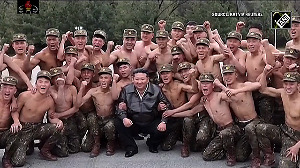Thomas Harding, The Daily Telegraph's defence correspondent, reported on Monday that the casualty rate for British soldiers in Afghanistan is rapidly approaching levels experienced at the height of the Second World War.
Citing official figures, Harding reports that British soldiers in Afghanistan are currently suffering a 10 per cent casualty rate, just a tick below the 11 per cent loss rate Britain suffered at the peak of the global conflict more than 60 years ago.
More worryingly, Harding reports a tremendous surge in fighting -- and consequently, casualties -- over the past six months, pointing to a resurgence in the Taliban.
Thus, three British soldiers were wounded in Afghanistan in November 2006; against that, in May British troops reported 38 casualties.
Taken in tandem with another worrying statistic -- British troops are suffering a higher fatality rate than their American counterparts in Iraq -- Harding suggests that the implications for Britain's armed forces are alarming, with negative impact likely on both operations and morale.
Approximately 7,000 British troops are stationed in Afghanistan. Britain's defence ministry puts the casualty rate at around the three per cent mark, but these figures have been widely questioned.
Last year Major John Swift, then commanding a company of the Royal Regiment of Fusiliers in Afghanistan, said the scale of casualties is not being accurately reported.
Harding reports that the defence ministry in its reporting avoids mention of the casualties suffered by three infantry battalions on the front line; when this is factored in, the report says, the figures touch the 10 per cent mark.
The First Battalion of the Royal Anglians is among the worst hit. Of the 650-strong battalion, 42 have been killed or seriously wounded in the first three months of its tour of duty.
With fighting expected to intensify, officers of the battalion -- which is more popularly referred to as the Vikings -- are bracing for the casualty rate to double.
Harding reports it is increasingly becoming difficult to replace those falling on the field of battle. While those falling in battle are hardened, front-line soldiers with experience of Afghanistan, the defence ministry has been forced to replace the dead and injured with fresh, 18-year-old recruits straight out of basic training.
The two other British infantry regiments on the front line -- the Worcestershire and Sherwood Foresters and Grenadier Guards -- report similar casualty figures, and similar problems.
Defence ministry officials argued that the casualty figures include those who have been struck by various ailments, and is thus not an accurate reflection of the state of affairs.
They suggested it is 'nonsense' to equate the casualty figures in Afghanistan with those suffered by British troops in World War II.
Harding reported that Opposition politicians accuse the government of short-changing the troops, of not providing sufficient resources to conduct the war.
'The fear that we have is that casualties may be higher than otherwise would be the case if our forces fighting in this dangerous theatre were properly resourced,' Harding quotes Julian Lewis, the Opposition Conservative party official in charge of defence, as saying.





